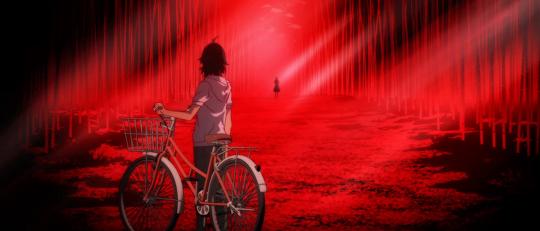You don't come to Nisemonogatari (lit. Impostory) for the plot or characters, you come to it to watch an art director take an LSD trip through modernist architecture and a paint-palette orgy. You come for the in-jokes and the riffs on other media. You come to listen to what few other series ever dare to try: banter. And what banter. This is not the banal monologues which often pass for conversation but a shotgun approach to dialogue: sometimes funny, sometimes racy, othertimes just oblique.
But nothing happens.
The opening episodes serve as a "previously on Bakemonogatari" complete with the old trick of changing the characters' hairstyles is used to indicate the passage of time and to shoot ardent fans into apoplectic bliss. But so far this is just a retread of the same setups and gags that its prequel had. There is the briefest of cameos from an antagonist in the third episode and two new but so far underutilised characters, but Senjougahara is still domineering and obnoxious just as Sengoku is demure and fawning.
"There is more to come!" is the fervent cry from fans. And that fervour is what sustains this. It relies on the energy, the wry humour, the back and forth and the obscenely stylish animation to sustain itself because neither the characters' personalities or glacial story can. It's to its credit that such difficult to maintain elements can carry what is often borderline pornography.
SHAFT and director Akiyuki Shinbo get a pass here for their frequent fan-service and inappropriate nudity because, while it always makes you feel dirty, there's an element of class that overpowers the guilt. Perhaps if the visuals don't titillate then the discussions on polygamy or implied paedophilia will appeal to the more cerebral.
For the most part it works. It's prequel Bakemonogatari fell too quickly into a pattern that was repeated through the series, the first three episodes here have been anything other than formulaic. But it exists on a knife edge between wearing a knowing smile and being a vanity project - where those involved in making it enjoyed themselves more than the audience does. The series demands attention and has enough style to justify it, but with the upcoming anime film and the remainder of the series to go, whether it will avoid the studio's penchant for eventually "phoning it in" (Sayonara Zetsubou Sensei et. al.) is the burning question.





What a beautiful, concise way of putting it. Bakemonogatari and Nisemonogatari are shows that have left me puzzled as a critic, because I can plainly see through their deficiencies, and its strengths shouldn't be enough to make up for them, but I still love the final package.